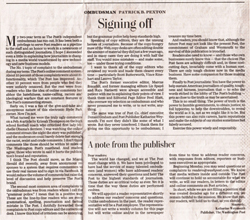The Washington Post has eliminated its ombudsman position after 43 years and designated a “reader representative” who is a Post staffer to write about reader concerns “from time to time.”
The Post said March 7 that reporter and editor Doug Feaver would be its first reader representative to serve “as an advocate for readers, responding to their questions and concerns.”
Feaver will work with newly minted assistant reader rep Alison Coglianese on contributions to a blog.
Feaver has worked on the Post’s business, national and metro staffs, as well as its digital unit, Washingtonpost.Newsweek Interactive. He was executive editor of washingtonpost.com and led the dot.comments blog until 2009.
Coglianese was opinion page editor at The Morning Call (Allentown, Pa.) before joining the post.
Publisher Katharine Weymouth, in a “note from the publisher” that accompanied the final ombudsman column in Sunday’s (March 3) paper, said the new reader rep would be a Post employee, unlike previous ombudsmen, and write online and/or in the paper “from time to time to address reader concerns, with responses from editors, reporters or business executives as appropriate.”
 |
The Post had an ombudsman for 43 years.
Patrick Pexton, who served as the paper’s ombudsman for the past two years after he was deputy editor at the National Journal, called his tenure a “privilege” and “honor” in his final column, praising staff and management for cooperating. A few weeks earlier, Pexton acknowledged paper’s deliberations about axing the position and made a financial and ethical case for keeping the ombudsman role.
Weymouth said the “world has changed,” adding that it is time for the ombudsman duties to “evolve.” She suggested “media writers inside and outside The Post” will hold it accountable for its work.
NPR’s ombudsman, Edward Schumacher-Matos, blasted the decision in a long blog post on March 1, saying the Post is “sticking its head in the sand.” Wrote Schumacher-Matos: “It eliminated a position that builds audience trust precisely at a time that this fundamental and fickle quality — trust — in the Post and all American news media is declining. That reduced trust, as much as changing business models, is responsible for the economic travails with which the Post is struggling, and ostensibly seeking to combat by eliminating the ombudsman to save both money and face. The circular irony is sad.”
Alyssa Rosenberg, who writes for TheAtlantic.com and Slate, wrote in a ThinkProgresscolumn, “Replacing the ombudsman with a reader representative feels diminishing, a step down to an emphasis on the local reaction to the paper rather than a continued emphasis on the Post’s national reputation.”
Criticism also came from within the paper. Media and opinion writer Erik Wemple listed the ombudsman’s end amid an “inventory” of “the piecemeal dismantlement” of the Post, including shuttering domestic bureaus, buyouts of experienced journalists, elimination of a standalone business section, and downsizing of regional Metro bureaus.



 Have a comment? Send it to
Have a comment? Send it to 
No comments have been submitted for this story yet.